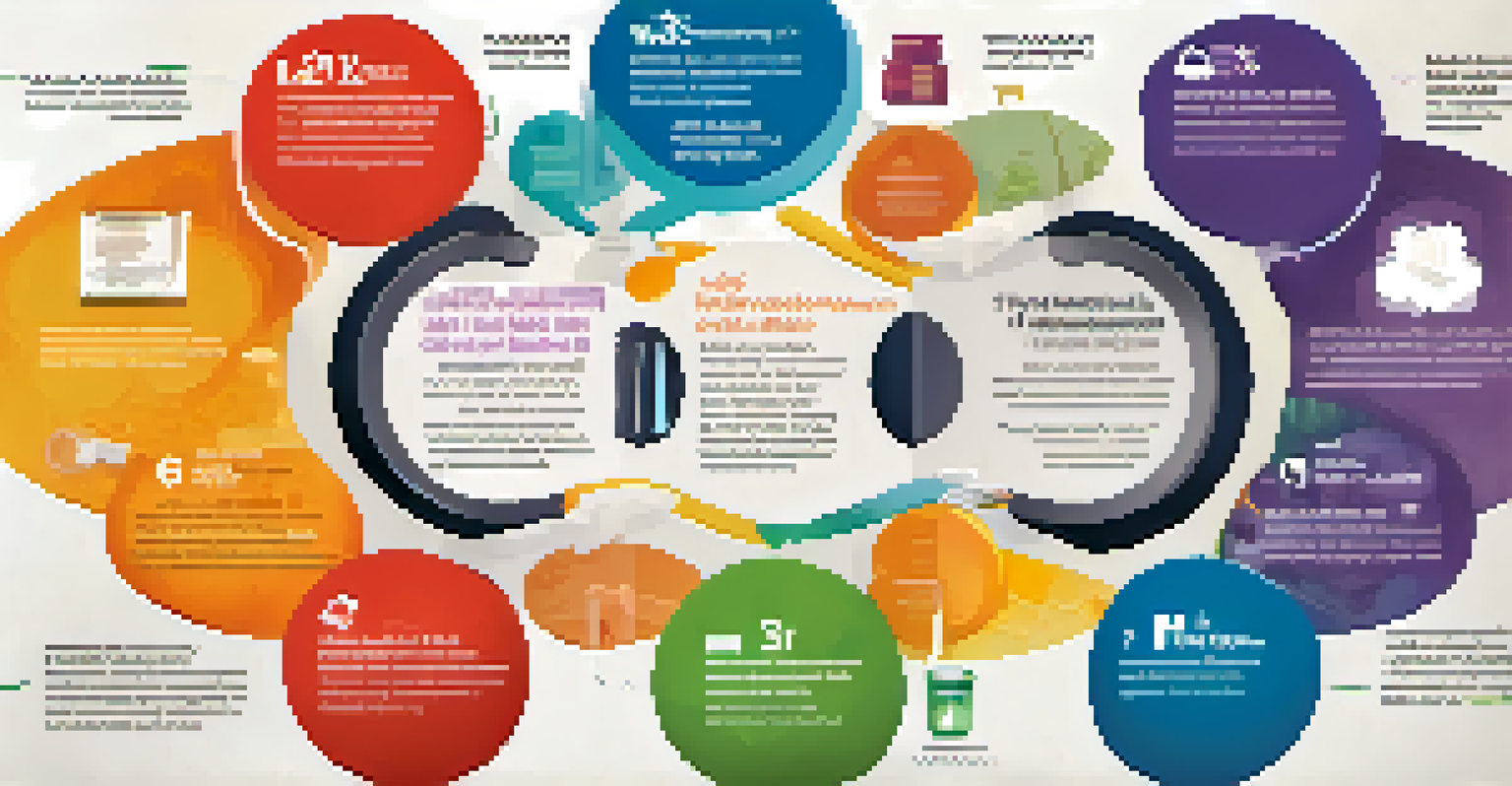Health Literacy and Its Impact on Public Health Outcomes

Understanding Health Literacy: What It Means
Health literacy refers to the ability to access, comprehend, and utilize health information. It empowers individuals to make informed decisions about their health and navigate the healthcare system effectively. For example, a person with good health literacy can understand prescription labels or medical instructions, leading to better health management.
Health literacy is a vital part of public health and empowers individuals to take control of their health.
This concept goes beyond reading skills; it also encompasses numerical skills, critical thinking, and the ability to communicate effectively with healthcare professionals. When individuals understand their health conditions and treatment options, they are more likely to adhere to medical advice and participate in their care actively. This engagement can lead to improved health outcomes.
By enhancing health literacy, we can bridge the gap between healthcare providers and patients, making health information more accessible. In essence, health literacy is a key player in fostering healthier communities and reducing health disparities.
The Role of Health Literacy in Public Health
Health literacy plays a critical role in public health by influencing health behaviors and outcomes. When communities are well-informed, they are more likely to engage in preventive measures, such as vaccinations and screenings. For instance, during a health crisis like a pandemic, clear communication can significantly impact public compliance with health guidelines.

Moreover, populations with higher health literacy levels tend to have better access to healthcare services. This accessibility leads to timely diagnosis and treatment, which can drastically reduce the prevalence of chronic illnesses. By addressing health literacy, public health initiatives can be more effective and reach wider audiences.
Health Literacy Empowers Patients
Improving health literacy enables individuals to make informed healthcare decisions and manage their health more effectively.
Ultimately, enhancing health literacy contributes to the overall effectiveness of public health strategies. When individuals understand the information provided, they are empowered to take action, benefiting not only their health but also the community's health as a whole.
Impact of Low Health Literacy on Health Outcomes
Low health literacy can have devastating effects on health outcomes. Individuals with limited understanding often struggle to follow medical instructions, leading to poor disease management and increased hospitalizations. For instance, a diabetic person who cannot interpret blood sugar readings may face serious complications.
The ability to understand health information is crucial to making informed health decisions.
Additionally, low health literacy is associated with increased healthcare costs. When patients do not understand their conditions or treatments, they frequently return to emergency services, resulting in higher expenses for both themselves and the healthcare system. This cycle underscores the urgent need to address health literacy.
In summary, low health literacy not only affects personal health but also places a burden on public health resources. By prioritizing health literacy initiatives, we can mitigate these negative outcomes and promote a healthier population.
Strategies to Improve Health Literacy
Improving health literacy requires a multifaceted approach. One effective strategy is to simplify health materials, using plain language and clear visuals. For example, instead of complex medical jargon, using straightforward terms helps patients grasp essential information quickly.
Another vital strategy is community engagement. Workshops, seminars, and health fairs can educate individuals about health topics in accessible ways. By involving community members in these initiatives, we foster a sense of ownership and empowerment regarding their health.
Low Literacy Harms Health Outcomes
Low health literacy is linked to poor disease management, increased hospitalizations, and higher healthcare costs.
Moreover, healthcare providers play a crucial role in enhancing health literacy. Training professionals to communicate effectively and check for understanding can significantly improve patient interactions. These strategies collectively contribute to a more informed public, leading to better health outcomes.
The Connection Between Health Literacy and Health Equity
Health literacy is closely tied to health equity; both concepts aim to ensure everyone has the opportunity for optimal health. Individuals from marginalized communities often face higher barriers to understanding health information. This lack of access can perpetuate health disparities, making it essential to address health literacy in these populations.
By promoting health literacy, we can help level the playing field, ensuring that all individuals can make informed health choices. For example, providing culturally relevant resources can bridge the gap for those who may not speak the dominant language fluently. This inclusivity fosters a more equitable healthcare environment.
Ultimately, improving health literacy is a vital step toward achieving health equity. When everyone has the tools to understand their health, we move closer to a society where health outcomes are not determined by socioeconomic status or background.
Case Studies: Successful Health Literacy Programs
Numerous successful health literacy programs illustrate the positive impact of addressing this issue. One notable example is the 'Health Literacy Universal Precautions Toolkit,' which equips healthcare providers with strategies to communicate effectively with patients of varying literacy levels. The toolkit has shown promising results in improving patient understanding and compliance.
Another inspiring case is the 'Teach Back' method, where healthcare providers ask patients to explain back what they've learned. This technique not only reinforces understanding but also builds trust between patients and providers. Many hospitals that have implemented this method reported a decrease in readmission rates.
Strategies Enhance Health Literacy
Effective health literacy initiatives include simplifying materials, community engagement, and better communication by healthcare providers.
These case studies highlight that investing in health literacy programs pays off in improved health outcomes and reduced healthcare costs. By learning from these successes, we can develop more effective strategies to enhance public health overall.
The Future of Health Literacy and Public Health
As we look to the future, health literacy will play an increasingly crucial role in public health. With the rise of digital health tools, it's essential to ensure that technology is used to enhance, not hinder, health literacy. For example, mobile health apps should provide user-friendly interfaces that simplify access to health information.
Moreover, as healthcare becomes more personalized, individuals will need to navigate an expanding array of options. This evolving landscape makes health literacy even more vital; individuals must understand their choices to make informed decisions about their care. Ongoing education will be key to supporting this transition.

In conclusion, the future of health literacy is bright but requires continuous effort and innovation. By prioritizing health literacy in public health initiatives, we can create a healthier, more informed society that thrives.